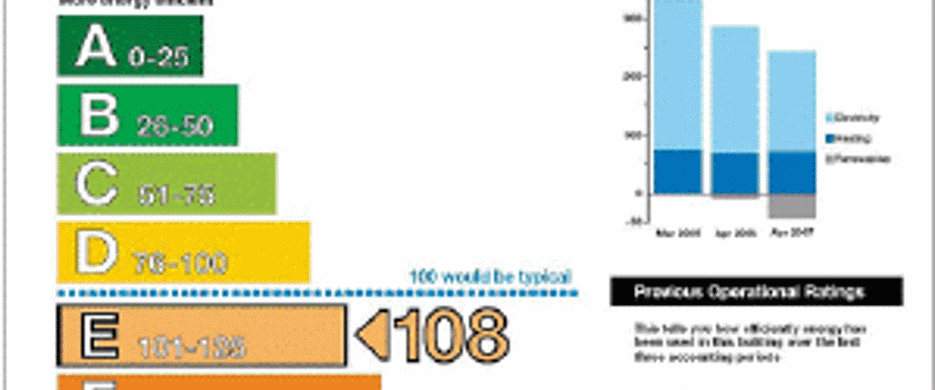Commercial Energy Performance Certificates
Commercial Energy Performance Certificates (“EPC”) and Changes to EPC Requirements (as of 01 April 2018)
What is an EPC?
An EPC denotes how energy efficient a building is on a scale of A-G, with A being the most efficient grade a property can obtain. Commercial Energy Assessors produce EPCs using standard measures and assumptions about energy usage, which means that a prospective tenant or buyer can easily compare the energy efficiency of one building with another. EPCs are valid for 10 years.
The cost of obtaining an EPC is dependent on the building itself.
When must you have an EPC?
You must have an EPC if you rent out or sell your property, or where a building is finished being constructed. You will also need an EPC when certain changes to the number of parts used for separate occupation are made.
It is the responsibility of the landlord or seller to make an EPC available for their property on a sale or new lease. However, tenants should beware that it is their responsibility to provide the EPC when they are assigning their lease to someone as they are effectively “selling” their interest on.
There are rules governing when a building owner must display their EPC, namely when the total useful floor area is over 500 square metres, where the building is frequented by members of the public, or where the building is being marketed for rental or sale.
When do you not need to have an EPC (“Exemptions”)?
Among other exemptions, where a building is listed or otherwise protected and meeting the minimum performance standards would unacceptably alter the building, an EPC is not required. It may also not be necessary to have an EPC where the building is temporary or only going to be used for up to two years. Buildings used for religious activities, detached buildings with under 50 square metres of floor space or buildings due to be demolished can also be exempt from the requirement to have an EPC.
Properties which have not been “dealt with” i.e. not sold or had new leases granted in respect of them since EPCs came into being in 2008 do not currently require an EPC until such time as their first “dealing”, though building owners should be aware of the changes to EPC regulations due to come into force in April 2023, detailed below.
There are some limited defences to not providing an EPC when one is required.
Pursuant to Regulation 38 of The Energy Performance of Buildings (England and Wales) Regulations 2012, you can be fined between £500 and £5,000 if you do not make an EPC available to any prospective tenant or buyer, with the exact level of the fine based on the rateable value of the property.
Changes
From 01 April 2018 it will be unlawful to grant or renew a new lease in respect of any commercial property (not already covered by one of the exemptions) with an EPC rating of F or G. Therefore, properties with a rating of F or G will need to have improvements made to them before a lease can be granted.
Landlords are only required to make cost effective and “appropriate” improvements to their properties, and if they can prove that they have tried to the best of their abilities to do so their property will be eligible for an exemption from the minimum E rating. Similarly, if a “relevant suitably qualified expert”, (i.e. an independent surveyor), deems that it would adversely affect the value of the property by at least 5% or otherwise damage the property if the improvement works were carried out, then an EPC rating of F or G may be acceptable.
Landlords who feel that their properties should be exempt from the new regulations are able to apply to have this exemption granted and registered on the Private Rented Sector Exemptions Register. Landlords will only be able to rely on an exemption if it has been registered. The register is likely to be available by the end of 2016.
Landlords, especially those with properties which are currently vacant or which will be vacant before 01 April 2018, must be thinking about how to bring their properties up to scratch so that a new EPC certificate showing an A-E rating can be issued. The regulations will extend to cover existing leases in April 2023, so landlords with current leases extending beyond April 2023 will have to consider making improvements to their properties too.
When bringing their properties up to scratch, landlords need to check whether they need their tenant’s consent to carry out the improvements.
If a landlord fails to bring their property up to at least an E rating, the local authority can issue a compliance notice and, if non-compliance continues, a significant fine of up to £150,000. This is a much higher fine than the fine for not supplying an EPC in the first place.
Tenants can be reassured that if a property is let in breach of the new regulations, the validity of the lease will be unaffected, as will the enforceability of any provisions under the lease.
The new regulations are likely to affect sellers (as opposed to just landlords) in the short term too. Obviously, a buyer will request an EPC (and the seller will be required to provide one) and any wary buyer would be best advised to consider the implications of buying a property with a lower than E rating in the lead up to the rule changes. This may see prospective sellers having to bring their properties up to scratch in the advent of the rule change to ensure a sale.
For further information
Please get in touch with our Commercial Property department if you think you will be affected by the changes or if you would like some further advice on the regulations governing EPCs or any other commercial matter. We will be happy to help. Call 0330 0945 500, email us at info@nevesllp.co.uk or complete our Contact Form and we'll get back to you.
All information is correct at the time of initial publication.

